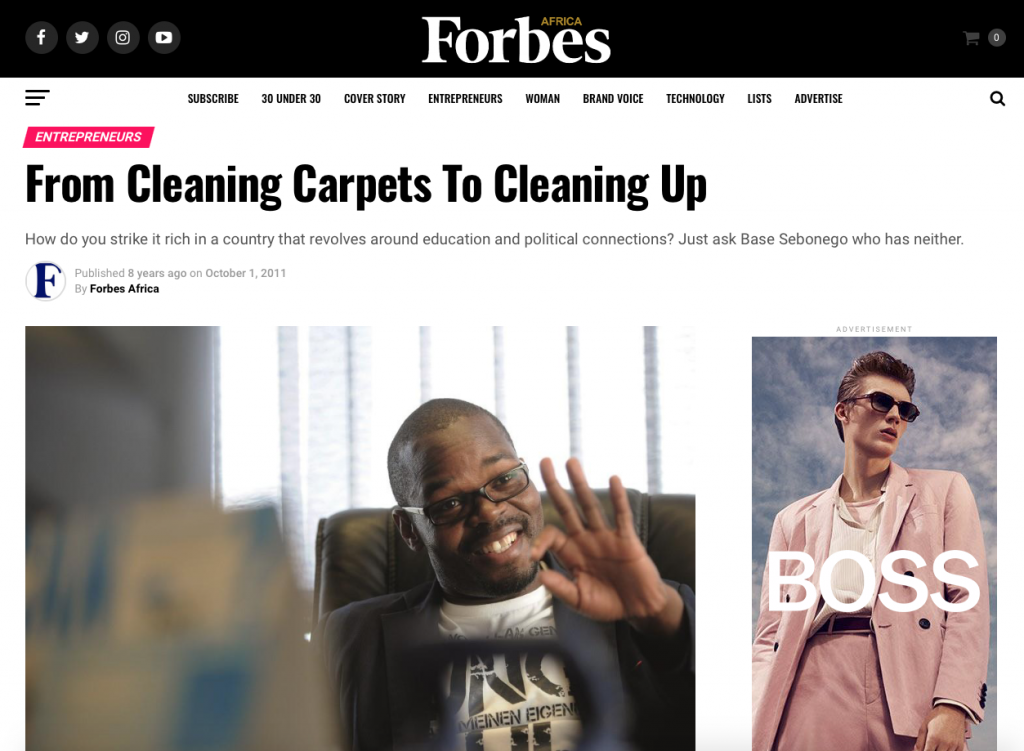The above comment was a post on social media by a Mr Base Sebonego. I had never heard of this gentleman until I saw this post, but a simple Google search provided me with a link to an interview with Base in 2011 by Forbes Africa. Base is a local entrepreneur and a highly successful businessman, so he knows what he’s talking about. By virtue of the fact I have never heard of him, he practises what he’s preaching and I salute that integrity.

http://www.forbesafrica.com/focus/2011/10/01/cleaning-carpets-cleaning/
“In a highly educated and developing country, where the private sector has relied heavily on government patronage for its survival, Sebonego is the exception. In fact, he shatters the historical mould of a successful Motswana businessman in a country where you find well-schooled university graduates in the most menial of jobs. He failed high school; has never been to a business school; started his business with no bank loan or help from government empowerment schemes.” – Forbes Africa
I found his comments to be a breath of fresh air that resonated with me. I actually felt validated because his views echo what I have been saying for years. But these things are better coming from a successful local than they are a foreigner.
Does self-promotion over brand awareness do more harm than good?
My own concerns with the limelight, media coverage and self-promotion have generally been brand-related and the skewed notion that personal branding and promoting an individual translates into business success. A notion I best describe as being ‘smoke and mirrors’ – 15 minutes of fame is a popular trend that has become an addiction with the media/social media platforms simply providing a fix.
I’ve said before that the lure of celebrity is more tempting than religion these days. We live in a shallow world where many folk want to be known and adored. Most will convince themselves the exposure is good for their business. But there are many multibillion-dollar businesses out there thriving, most of which we’ve never heard of and we have no idea who owns them.
Of course, any publicity for a startup is great, it is essentially free PR and generates awareness and every start up needs this. But for some, the attention is so addictive it leads to over-exposure. It’s fine to have your new business in the spotlight and introduce us to the owner’s background. But once that moment has passed its time to focus on business; too much focus on the individuals has its risks.
Too much too soon?
But some startups get media attention and others don’t, so what is the media’s criteria? Of those who are paraded, I often wonder what is it about their businesses that warrant such premature exposure? Are we really championing the fact someone started a business? Or are we celebrating its potential? Or are we just being sycophants?
Botswana is a ‘who you know’ culture that degrades the professional world and the reason we have finance people in marketing roles. Much like popularity on Facebook, too much media coverage too early can give a false consensus. Premature publicity can make some of us sceptical as we start looking at the names, connecting dots and possible associations. Should any be discovered, an audience can start to feel he/she/they had an unfair advantage. We are only human and Botswana being the way it is, such feelings are unavoidable. It’s like Base said, it can attract unnecessary attention and even envy and jealousy from family and friends.
Keeping a low profile and focusing on your business, your brand, rather than yourself allows you the freedom to fail. You can dwell in self-pity for a time and then dust yourself off and try again. Caution must be exercised and the hype must be controlled. As Base states, most start ups fail, so the media spotlight can be a huge platform of expectation from which to fall. The common belief is that half of new businesses fail during the first year. I would also argue there must be a number of startups that never even get off the ground. So why don’t we make more of a fuss about the businesses that made it to the 2-year mark and beyond?
It’s like Base said, we promote success stories before they are a success. If a new business can be ‘paraded’ before a single product is sold, surely some column inches can be dedicated to those who have established businesses. At the other end of the spectrum, if a business is hailed as ‘one to watch’ why isn’t the media still watching it?
Around a year or two ago I recall a new business was launched that had received generous funding from a prominent organisation. The business centred around a new and innovative online platform. The organisation arranged a glitzy launch event hosted at one of Gaborone’s prominent hotels. But 12 months or so later the online platform doesn’t exist anymore!
The million dollar question is why do local startups fail? Why are there no follow-up stories? If no one is learning from these unfortunate experiences, why perilously throw more and more funding at startups? Is it not prudent to fully understand the challenges? Understand why many startups don’t past the first year mark?
Ask yourself – why do startups fail?
Base has observed (with sadness) many startups with potential perish because of skewed priorities. Here are some of the common reasons businesses fail:
- Not investigating the market
- Not having a business plan or a strategy
- Not enough finance/investment
- Bad location, poor internet presence and/or poor marketing
- Rigidity
- Expanding too fast
I do not class myself as a business expert, but when I look at a new business I look at the brand and the branding/marketing. Sadly, I see very few that would stand up and compete in the global market. The brand is a fundamental aspect that is often overlooked. Many startups have received funding from organisations such as CEDA and LEA, but how capable are such organisations to assess this aspect?
Citizen Entrepreneurial Development Agency (CEDA) was established by the Government of Botswana to provide financial and technical support for business development with a view to promoting viable and sustainable citizen owned businesses. The Local Enterprise Authority (LEA) was established by the Small Business Act of 2004 to carry out the mandate of entrepreneurship and enterprise development in Botswana.
There are a number of aspects to consider when setting up a business, but the brand has to be a priority. We buy into brands, we don’t buy personalities. You don’t buy a football shirt because you like the owner of the club, you buy the shirt because you support the brand regardless of who owns the club.
Although it’s not just startups but rebrands too. Brand identities are designed and executed with little evidence of professionalism, creativity, experience and research. I see too many that look worryingly similar to other entities. On the one hand, I wonder if startups invest adequately in their brand design. On the other hand, established organisations are throwing investment [at rebrand design] down the toilet.
Businesses can also fail because there’s no variety and too much of the same. It is said there is a ‘copycat’ culture in Botswana in that someone sets up one business and a dozen others set up the exact same business. Can’t CEDA, LEA and alike control this?
Marketing and communications are vital for any business whether it’s a startup or a corporate giant. These days people place too much reliance on social media as their sole online presence. I’m pretty sure many see Facebook as a free alternative to an actual website. Yes, platforms such as Facebook are a great marketing tool, but ‘likes’ do not convert into sales. Not all your prospective customers have social media accounts. Although to be fair, it is a catch 22. Many of the popular web design agencies I’ve seen in Botswana have a massive deficiency where aesthetics are concerned. Don’t judge a book by its cover, but do judge a company by its website.
What is good/bad or too much publicity?
I’ve also noticed the description ‘entrepreneur’ is used all too easily when it comes to promoting startups. By definition, an entrepreneur is a person who sets up a business or businesses, taking on financial risks in the hope of profit. But those who receive funding/grants, their financial risk is minimal or non-existent. I also believe an entrepreneur is someone who sees a gap in the market and succeeds in filling that gap. So that rules out the copycats.

Base also warns against “playing the fool in the media and selling the world your dreams and aspirations instead of safeguarding those dreams and aspirations, nurturing them and translating them into reality.” Early publicity can also be a curse and one must tread carefully; it’s all too easy to divulge too much. Getting caught up in the moment and telling the interviewer about plans in the pipeline could prove detrimental.
Of course, it’s not easy to say no to publicity, but it is nice if it is merited. None-the-less, the points Base makes are points every business owner (present or future) in Botswana needs to understand, especially the youth. The type of media coverage he is talking about is a choice made by the business owner, many of which actively pursue or create their own. I’m sure there are people who will disagree with mine and Base’s opinions. But the fact remains we can read about a business without knowing who the business owner is.
Here’s the truth, outside of family and friends, no one cares who you are until you’ve achieved something. Most businesses these days should have ambitions to expand into global markets, but the market in the West loves products with a story that is authentic. You may well have a profile in Gaborone, but they don’t know who you are. They don’t care about privilege, connections or whether you are seen at popular venues sipping champagne. If you don’t have a compelling and genuine story, you better have a great product.
Base says a startup is a baby and you should treat it like one. Women who give birth in Botswana undergo ‘botsetsi’ – when mother and newborn are kept indoors and away from people for a minimum of three months. Botsetsi allows for mother and baby to connect and allow for the infant’s immune system to develop and strengthen. Reduced exposure allows for development… can you see where I’m going with this?
I believe brand awareness is important in the early stages, it’s better to push the brand. PR and communications should be carried out based on what’s best for your business rather than what’s best for your public status. There is a point in business when you have to realise that it’s not about YOU.
Opinion piece by YourBotswana writer




